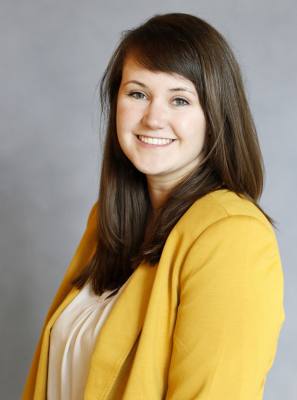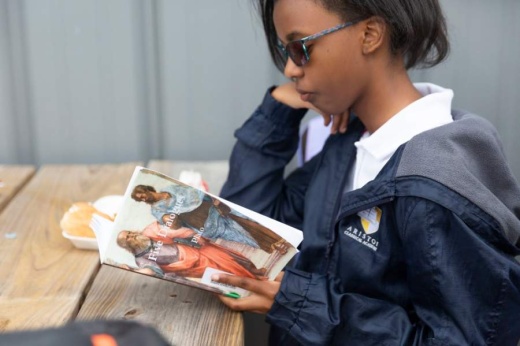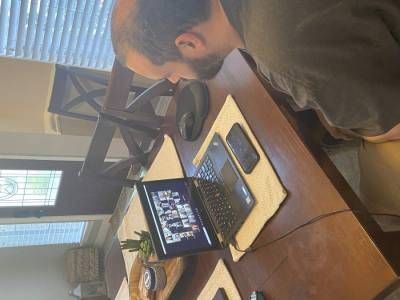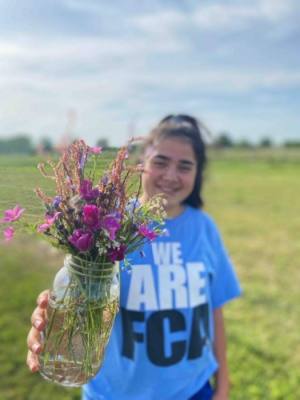“One of our teams has a high school barbecue team, and they had the kids make the dish they would have been in charge of for the barbecue competition,” said Ashlee Laird, a Katy ISD instructional specialist. “They packaged them all up in little individual containers, and the kids went and delivered them on everyone's porches, and everyone could critique their barbecue.”
Formerly an agriculture teacher for nine years, Laird is one of four career and technical education specialists in the district and oversees agriculture science teachers and professional communication teachers.
She estimates about 90%-92% of CTE students are doing their online work and participating in virtual classes, and many local chapters of the National FFA Organization still meet in the afternoons.
“Kids just like the CTE courses, and so they look forward to it,” she said.
Kathryn Locheed, the interim head of upper school for Aristoi Classical Academy, noted that the Katy charter school is encouraging a balance between school work and home life.
"We want our students to engage their minds but not be overwhelmed during this difficult time," she said.
Education at home
Mary Jane Williams—who leads Family to Family Network, a Katy-area nonprofit that helps families of children with disabilities navigate the complex web of services in the education system—said campus closures and virtual learning provide a great opportunity for parents to become more involved with their children’s learning.
“One thing we've always told families is you really need to work with your kid at home—you can't expect teachers to do it all,” she said. “I think it’s given families an opportunity to go ‘OK, so this is what they were working on.’”
During the coronavirus pandemic, schools are still required to follow individualized education programs, or IEPs, for students with disabilities who require special services, she said. Some of these services are adapting, such as a speech pathologist coming to make house calls, but other services are falling through the cracks, she said.
“The school and the parents should be communicating and documenting what they can’t possibly do,” she said. “We’ve been advising families to document what services and support they’re not getting, so when they go back, they know where things might need compensatory services [which is when districts make up the missed services].”
Laird and Williams recognized this is a difficult time for parents to motivate and teach their children, especially if the parents are working or worried about food and financial resources. Both encouraged parents to set schedules and a routine for their children. Laird suggested doing school work each weekday from 9 a.m.-2 p.m.
“I know it can be weary for parents, but [they need to] keep on their kids, and try to keep them on that schedule, and keep motiving them,” Laird said.
In fact, many teachers who have their own children are going through the same issues, said Terry Boling, head of elementary school at Aristoi Classical Academy.
“The most challenging aspect for the teachers has been balancing their teaching careers with the demands of their home life and allotting the time to supervise the teaching of their own children at home,” he said.
But through a community effort, teachers, students and their families can come through this challenging time, Locheed said.
“One of the ways man has risen to meet difficulties is through working together as a community,” she said. “We are striving at Aristoi to stay connected to our families.”
Rising to the challenge
Laird said her teachers have come up with creative ideas to adapt to online learning and keep students on track with their studies and career goals. She estimates about 1,000 agriculture students will take tests over the next few months to become certified in floral design, welding and animal science.
To help all floral design students, the 13 KISD floral teachers banded together and divided out the eight chapters of the Texas Floral Association Certification to prepare students for the online knowledge-based certification test in May, Laird said.
“Each [KISD high] school took a chapter, and they’ve made fun, interactive lessons and little quizzes to get the kids through all the chapters,” she said, adding the lessons are then shared with the other high schools via Canvas, a learning management platform.
Many teachers have been using video-sharing platforms such as TikTok and Flipgrid to create interactive and engaging lessons for students, she added.
Laird said her husband, who is a KISD agriculture science teacher, creates a funny YouTube video each Sunday to share with his students on Monday to keep them engaged and ready to learn. After giving an assignment, the students are encouraged to upload a funny video in response.
“They’re just trying to banter back and forth,” she said.
Recognizing each family may have varying circumstances, Aristoi Classical Academy teachers have prerecorded video lessons for students to watch on their own time, Boling said. The charter school is also offering livestreaming to let teachers and students interact with each other, he and Locheed said.
“This time of isolation reminds teachers and administrators what a blessing it is to be in the presence of their students, and I hope it reminds students not to take for granted the joy of learning among friends,” Locheed said.







